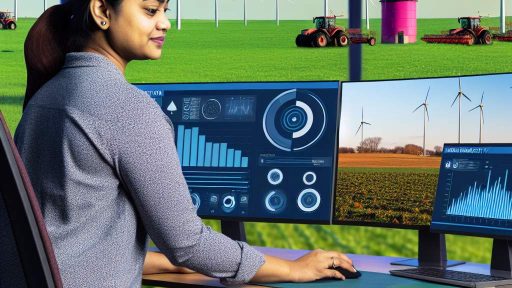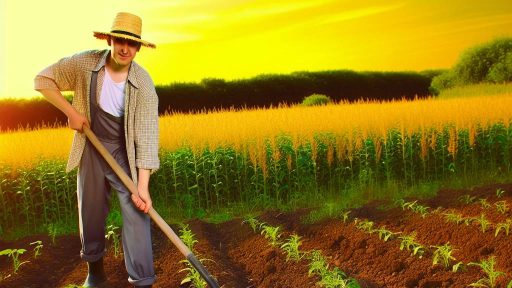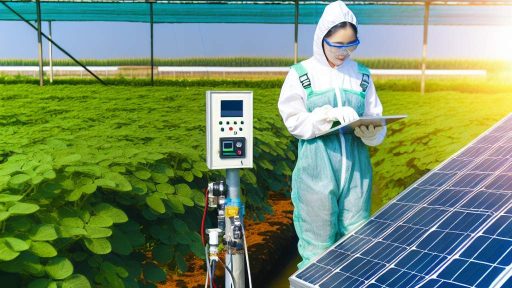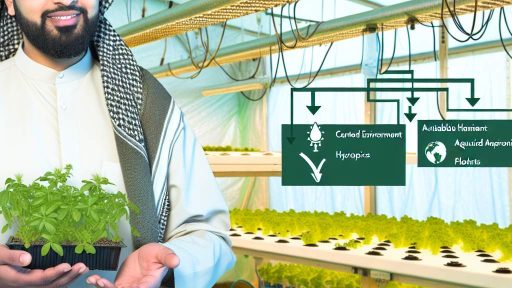Introduction to Drones in Agriculture
Drones are transforming agriculture in unprecedented ways.
Their role in farming has expanded rapidly over the last few years.
Farmers now utilize drones for various applications.
One vital application is efficient irrigation management.
Using drones enables farmers to monitor crop health effectively.
This monitoring helps optimize water usage across fields.
Benefits of Drone Technology in Farming
Drones offer several advantages to modern farmers.
They provide real-time data collection on crop conditions.
Moreover, drones enhance decision-making capabilities.
This leads to more efficient resource allocation.
Consequently, farmers can reduce water waste and improve yields.
Assessing Soil Moisture Levels
Accurate soil moisture measurement is crucial for irrigation.
Drones equipped with thermal cameras can assess moisture levels.
This technology identifies dry areas that need immediate attention.
By targeting specific zones, farmers can apply water more wisely.
Transform Your Agribusiness
Unlock your farm's potential with expert advice tailored to your needs. Get actionable steps that drive real results.
Get StartedMapping and Planning Irrigation Strategies
Using drones, farmers can create detailed maps of their fields.
These maps highlight irrigation needs based on crop types and conditions.
Farmers can design targeted irrigation systems effectively.
This ensures that all crops receive adequate hydration.
Real-World Applications
Many farmers are already implementing drone technology.
For instance, Maria’s Organic Farm uses drones to manage irrigation.
They have successfully reduced water consumption by 30%.
Similarly, GreenFields Agriculture has reported increased yields.
Challenges and Considerations
Despite their benefits, drone technology presents challenges.
Initial investment costs can be high for small farmers.
Additionally, regulatory issues may arise when using drones.
Farmers must understand local laws regarding drone usage.
The Future of Drones in Agriculture
The future looks bright for drones in farming.
As technology advances, drones will become more affordable.
Integration with AI will enhance their capabilities significantly.
Farmers will increasingly rely on drones for precision agriculture.
Overview of Irrigation Management Challenges
Irrigation management faces numerous challenges in modern farming.
Water scarcity remains a pressing issue in many regions.
Farmers often struggle with inefficient water usage and distribution.
Inconsistent weather patterns complicate irrigation planning.
Additionally, soil type and condition affect water retention.
Impact of Climate Change
Climate change dramatically alters traditional farming practices.
Rising temperatures increase evaporation rates in water sources.
More extreme weather events create unpredictable irrigation needs.
Showcase Your Farming Business
Publish your professional farming services profile on our blog for a one-time fee of $200 and reach a dedicated audience of farmers and agribusiness owners.
Publish Your ProfileFarmers must adapt their practices to survive in changing conditions.
Cost of Water and Energy
The rising cost of water influences farming decisions.
Many farmers face high energy expenses to pump water effectively.
Sustainable solutions must address these financial pressures.
Adopting efficient irrigation systems can reduce overall costs.
Technological Barriers
Many farmers lack access to advanced irrigation technologies.
Older systems may require costly updates to improve efficiency.
In addition, training on new technologies is often limited.
Farmers need ongoing education to implement modern solutions.
Environmental Concerns
Irrigation practices can lead to environmental degradation.
Over-irrigation causes soil salinization and degradation.
Effective management must balance productivity with environmental health.
Farmers need strategies to minimize negative impacts on ecosystems.
How Drones Improve Water Usage Efficiency
Precision Watering Techniques
Drones enable farmers to employ precision watering techniques.
These technologies allow for targeted application of water.
This ensures crops receive the right amount of hydration.
Thereby, it prevents wastage and enhances soil moisture retention.
Real-Time Data Collection
Drones gather real-time data on crop health and soil conditions.
This data informs farmers about specific watering needs.
Consequently, farmers can make educated decisions on irrigation schedules.
As a result, water consumption becomes more efficient.
Identifying Irrigation Problems
Drones help identify irrigation problems in large fields.
They can spot dry areas that require immediate attention.
Furthermore, drones detect over-irrigated zones, reducing excess water use.
Overall, this technology aids in maintaining optimal irrigation practices.
Cost-Effective Solutions
Utilizing drones can significantly lower irrigation costs.
Farmers save money by applying water more judiciously.
This efficiency leads to reduced energy consumption as well.
Hence, drones contribute to sustainable farming practices.
Uncover the Details: Precision Irrigation Systems Enhancing Sustainable Farm Practices
Types of Drones Suitable for Irrigation Monitoring
Fixed-Wing Drones
Fixed-wing drones excel in covering large agricultural areas efficiently.
They fly longer distances without needing frequent recharges.
This allows for comprehensive irrigation assessments across vast fields.
Moreover, their design provides better stability in windy conditions.
Multirotor Drones
Multirotor drones, like quadcopters, offer agile maneuverability.
They are excellent for detailed inspections of specific areas.
These drones can hover and take precise measurements at low altitudes.
Consequently, they provide valuable data on localized irrigation needs.
Hybrid Drones
Hybrid drones combine the benefits of fixed-wing and multirotor designs.
They provide both long-range capabilities and precise hovering abilities.
Showcase Your Farming Business
Publish your professional farming services profile on our blog for a one-time fee of $200 and reach a dedicated audience of farmers and agribusiness owners.
Publish Your ProfileThis versatility allows for quick assessments of large fields.
Furthermore, they adapt easily to various farming environments.
Specialized Drones for Irrigation
Some drones come equipped specifically for irrigation management.
These models often have advanced sensors for moisture detection.
Additionally, they can offer real-time data analysis for farmers.
Such features improve decision-making for water resource management.
Key Features to Consider
Certain features enhance the efficacy of irrigation monitoring drones.
Look for drones with high-resolution cameras for detailed imagery.
Also, consider models with thermal imaging for moisture assessment.
Durability against the elements can be another significant factor.
Popular Brands and Models
Several brands lead the market in irrigation drones.
DJI offers reliable models well-suited for agricultural applications.
Parrot provides options, particularly emphasizing user-friendly interfaces.
Yuneec also presents competitive drones with innovative features.
Uncover the Details: Economic Advantages Of Growing Genetically Modified Crops
Technological Advances in Drone Capabilities
Enhanced Sensors and Imaging Technology
Drones now feature advanced sensors and high-resolution cameras.
These capabilities enable farmers to monitor crops more effectively.
Infrared and thermal imaging help identify irrigation needs promptly.
Farmers gain insights into water stress and plant health efficiently.
Automation and Data Analysis
Automation of drone flights optimizes the irrigation process significantly.
Farmers can schedule flights based on weather conditions and crop schedules.
Data analysis software enhances the interpretation of aerial imagery.
This leads to better decision-making in irrigation management.
Integration with IoT and AI Technologies
Drones now work seamlessly with IoT devices on farms.
This integration allows for real-time data collection and monitoring.
AI algorithms analyze data to provide actionable insights.
Farmers can pinpoint areas needing immediate attention.
Field Mapping and 3D Modeling
Drones create detailed field maps and 3D models with ease.
This information allows for precise irrigation planning.
Farmers can visualize problem areas quickly through mapping technology.
Such models enhance resource allocation and water usage efficiency.
Cost-Effectiveness and Accessibility
The price of drones has decreased, making them more accessible.
Farmers can invest in drone technology without heavy financial burdens.
Improved battery life and performance increase their operational efficiency.
As a result, even small farms can benefit from drone technology.
Delve into the Subject: The Role Of Biotechnology In Pest Management
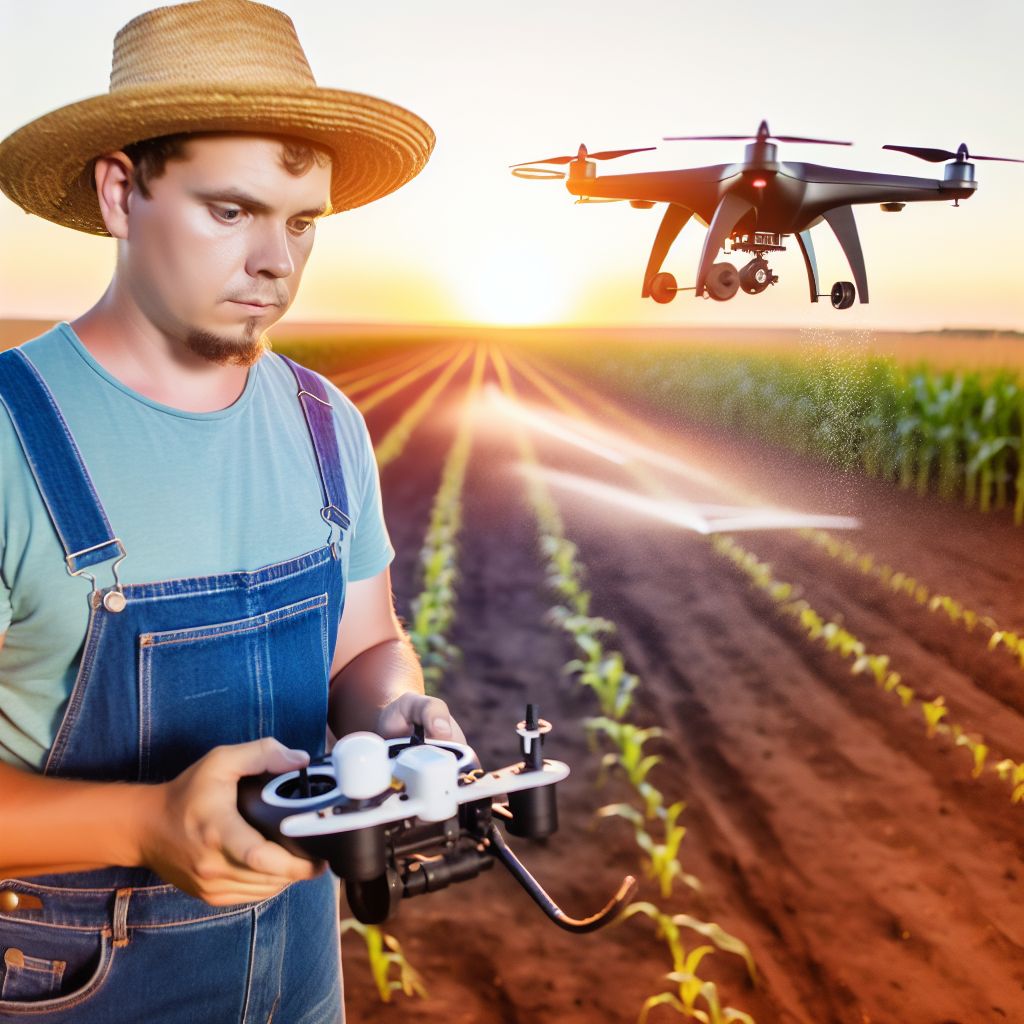
Case Studies: Successful Drone Implementations in Irrigation
Introduction to Drone Applications
Drones have revolutionized irrigation management in agriculture.
Farmers now utilize aerial imagery and real-time data for better decisions.
This technology enhances water efficiency and crop health.
Farm Innovations: Green Valley Farms
Green Valley Farms implemented drones for crop monitoring in 2022.
Showcase Your Farming Business
Publish your professional farming services profile on our blog for a one-time fee of $200 and reach a dedicated audience of farmers and agribusiness owners.
Publish Your ProfileThe farm experienced a 20% reduction in water usage.
Drones enabled precise irrigation scheduling based on real-time data.
Additionally, farmers identified water stress areas quickly.
Success Story: Prairie Winds Agricultural Co-op
Prairie Winds Agricultural Co-op adopted drone technology in 2021.
They integrated it with their irrigation systems for optimal performance.
The co-op increased its yield by 15% over two growing seasons.
This success demonstrated quick, targeted irrigation solutions.
Case Example: Sunnydale Organic Farms
Sunnydale Organic Farms utilized drones for soil moisture assessment.
The results guided farmers in making informed irrigation decisions.
Consequently, efficiency improved, leading to healthier crops.
Moreover, the approach supports sustainable farming practices.
Collaborations with Tech Companies
Farmers have partnered with tech companies for drone insights.
These collaborations enhance the understanding of crop needs.
This synergy aims to refine irrigation methods continuously.
Farmers can access advanced analytics through these partnerships.
Future Prospects in Irrigation Management
The future of drone technology in irrigation appears promising.
Innovative solutions aim for even greater efficiency.
With ongoing advancements, crop irrigation will undergo robust transformation.
Farmers will continue to embrace technology for sustainable farming.
Find Out More: Sustainable Crop Rotation Methods Enhanced by Technological Advances
Cost Analysis of Drone Use Compared to Traditional Methods
Initial Investment and Equipment Costs
Drone technology requires a significant initial investment.
The price of a high-quality agricultural drone can vary widely.
Farmers must also consider expenses for necessary software.
In contrast, traditional irrigation systems typically involve lower immediate costs.
However, their installation can be labor-intensive and complex.
Over time, drones may prove more cost-effective due to reduced labor needs.
Operational Costs
Using drones can result in lower operational costs for farmers.
They reduce the need for manual labor during irrigation management.
This efficiency helps farmers save on labor costs.
Additionally, drones optimize water usage effectively.
They provide precise data on moisture levels in crops.
Traditional methods often waste water due to less accurate assessments.
Maintenance and Long-Term Expenses
Maintaining drones involves specific routine checks and software updates.
While drones require upkeep, traditional systems face frequent maintenance challenges.
Pipes and pumps can suffer from wear and may need replacement.
In contrast, drones usually have a longer lifespan with proper care.
As a result, their long-term expenses may be more predictable.
Return on Investment (ROI) Considerations
Calculating ROI is essential for farmers considering new technology.
Drones offer quick data collection, allowing faster decision-making.
This timely information can lead to better crop yields.
Showcase Your Farming Business
Publish your professional farming services profile on our blog for a one-time fee of $200 and reach a dedicated audience of farmers and agribusiness owners.
Publish Your ProfileConsequently, farmers may see a quicker return on their investment.
Every increased yield can translate to higher profits.
Traditional methods may take longer to show similar increases in productivity.
Benefits of Adopting Drone Technology
Drones present a compelling cost analysis for modern agriculture.
They maximize efficiency and minimize waste in irrigation management.
Farmers must weigh initial costs against long-term savings carefully.
Ultimately, switching to drones may offer substantial benefits over time.
Future Trends: The Role of AI and Machine Learning in Drone Irrigation
Enhancing Precision Agriculture
AI and machine learning are revolutionizing precision agriculture.
Drones equipped with these technologies collect data more effectively.
This data allows farmers to monitor soil moisture levels accurately.
Consequently, they can make informed irrigation decisions.
As a result, water usage is optimized, saving resources and costs.
Predictive Analytics for Crop Needs
Machine learning algorithms can analyze large datasets from drones.
These analyses predict crop water requirements based on weather patterns.
Farmers can schedule irrigation more efficiently as a result.
This minimizes water waste and enhances crop yield.
Automated Irrigation Systems
Integration of AI allows for automated irrigation systems.
Drones can trigger irrigation systems based on real-time data.
Such automation reduces labor costs significantly.
Additionally, it ensures optimal watering conditions for crops.
Improved Monitoring and Reporting
Advanced drone technology enables better monitoring of crop health.
AI analyzes drone imagery to identify areas needing attention.
Farmers receive timely reports about irrigation issues.
This proactive approach prevents overwatering or underwatering situations.
Future Enhancements and Innovations
As technology evolves, drone capabilities will expand further.
We can expect smarter, more efficient irrigation solutions.
AI-driven drones will adjust irrigation in real-time.
Such continuous optimization will promote sustainable farming practices.
Additional Resources
Innovations in Seed and Farming Technologies Drive Productivity …

